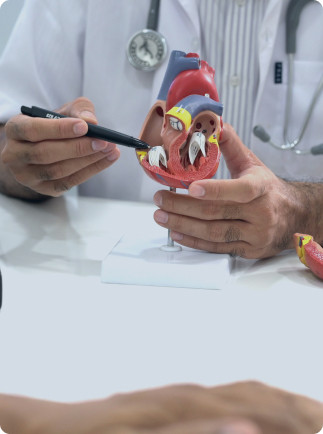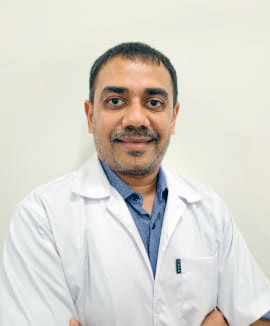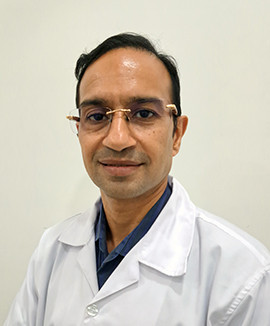Cardiology
- Home
- /
- Cardiology

Cardiology Department
At AHCH we have a special focus on preventive and diagnostic cardiology, our expert team of cardiologists is committed to promoting heart health and delivering personalized care to our patients.
Cardiology
What We Treat
- Coronary Artery Disease (CAD)
- Hypertension (High Blood Pressure)
- Arrhythmias
- Heart Failure
- Valvular Heart Disease
- Cardiomyopathy
- Peripheral Artery Disease (PAD)
Electrocardiogram (ECG)
An Electrocardiogram (ECG) is a medical test that records the electrical activity of the heart over a period of time. It provides valuable insights into the heart's rhythm, rate, and any potential abnormalities. ECGs are commonly used to diagnose heart conditions such as arrhythmias, heart attacks, and other cardiac issues.
Echocardiography (2D Echo)
This non-invasive imaging technique uses ultrasound to visualize the structure and function of the heart, allowing our cardiologists to diagnose and monitor various heart conditions. 2D Echo provides detailed images of the heart's chambers, valves, and blood flow, aiding in the detection of abnormalities such as valve disorders, heart muscle problems, and congenital heart defects. It plays a crucial role in assessing heart function, determining the efficiency of blood pumping, and identifying any areas of impaired blood flow.
Treadmill Stress Test (TMT)
The TMT, also known as exercise stress test or exercise electrocardiography, is performed to evaluate the heart's response to physical activity. During the test, you will walk on a treadmill while your heart rate, blood pressure, and ECG are monitored. TMT helps assess the heart's blood supply and detects any underlying coronary artery disease. It is a valuable tool in determining exercise tolerance, diagnosing chest pain causes, and evaluating the effectiveness of cardiac treatments.
Doctors for Cardiology

Dr. Tejas V. Patel
Cardiology
Qualification
MBBS, MD, DM (Cardiology)

Dr. Vipul Kapoor
Cardiology
Qualification
MBBS, MD, DNB, MNAMS, FESC, FSCAI
FAQ
Cardiology is the medical specialty that focuses on diagnosing and treating conditions related to the heart and blood vessels.
A cardiologist is a specialised doctor who diagnoses and treats heart diseases and conditions. They perform physical examinations, order diagnostic tests, interpret results, provide treatment plans, and offer guidance on heart health and disease prevention.
You should consider seeing a cardiologist if you experience symptoms such as chest pain, shortness of breath, heart palpitations, dizziness, or if you have a family history of heart disease. Additionally, if you have risk factors like high blood pressure, high cholesterol, or diabetes, it’s advisable to consult a cardiologist for preventive care.
Common risk factors for heart disease include high blood pressure, high cholesterol levels, smoking, obesity, diabetes, family history of heart disease, sedentary lifestyle, stress and age (risk increases with age).
Symptoms of a heart attack may include chest pain or discomfort, shortness of breath, pain radiating to the arms, jaw, neck or back, nausea, lightheadedness, and cold sweats. It’s important to seek immediate medical attention if you suspect a heart attack.
HIgh blood pressure is diagnosed through blood pressure measurements. Management may involve lifestyle changes such as a healthy diet, regular exercise, weight management, stress reduction, and medication as prescribed by your doctor.
Coronary artery disease is a condition in which the blood vessels that supply the heart with oxygen and nutrients become narrowed or blocked by plaque buildup. This can lead to reduced blood flow to the heart, resulting in chest pain (angina), heart attacks, or other heart-related complications.
Treatment options for coronary artery disease may include lifestyle changes (diet, exercise, smoking cessation), medications (e.g., cholesterol-lowering drugs, antiplatelet therapy), angioplasty with stenting, or coronary artery bypass grafting (CABG) surgery, depending on the severity of the condition.
An arrhythmia is an abnormal heart rhythm. It can manifest as a fast heartbeat (tachycardia), slow heartbeat (bradycardia), or irregular heartbeat. Some arrhythmias are harmless, while others may require medical intervention.
Arrhythmias can be diagnosed through tests such as electrocardiogram (ECG), Holter monitoring, or event monitoring. Treatment options may include medications, lifestyle changes, implantable devices (pacemakers, defibrillators), or procedures like catheter ablation.
Book an Appoinment
Thank you for your connecting us for appointment. We value your concern and we will revert back shortly to confirm your appointment details.


